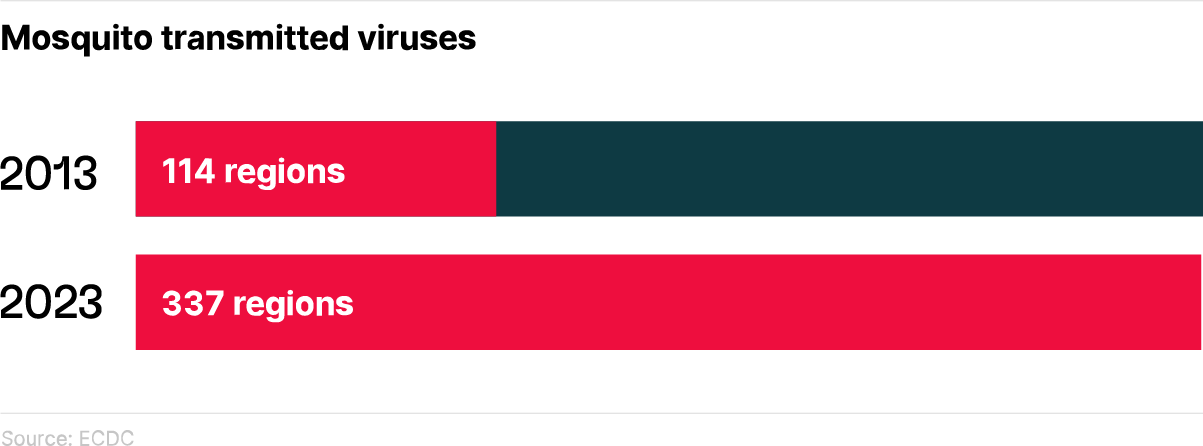01
Climate Change in Europe
The impact of climate change is already being felt in Europe. Flooding, droughts, heatwaves, wildfires and other natural disasters are lasting longer while also becoming more intense and more frequent. Europe has been warming twice as fast as the global average since the 1980s, and this trend is expected to continue in the years to come.
As temperatures continue to rise, the impact on public health in Europe is likely to be significant, with an increased risk of climate-sensitive disease outbreaks and health problems stemming from wildfires. All these factors and climate change in general can also lead to trip cancellations, disruptions or travel delays and restrictions.
The expansion of climate-sensitive infectious diseases
Climate change has produced more favourable conditions for the emergence, transmission and geographic expansion of invasive mosquito species known to transmit diseases such as malaria, dengue fever, yellow fever, chikungunya, Zika virus and West Nile fever. Locally transmitted outbreaks of dengue, chikungunya and West Nile fever have already been recorded in southern and southeastern Europe in recent years.

The Aedes albopictus mosquito – known to transmit dengue, chikungunya and Zika virus – has spread further north and west, establishing itself in 337 regions across 13 European countries as of 2023, up from 114 regions across eight European countries in 2013. The Aedes aegypti – known to transmit dengue, yellow fever, chikungunya and West Nile fever – became established in Cyprus last year and could spread to further European countries. Europe has also witnessed a constant increase in the risk of West Nile virus transmission since 2000, with 1,112 locally-acquired cases in 11 European Union (EU) countries in 2022 – the highest number of cases since 2018, when a major outbreak in Europe resulted in 180 deaths. The annual length of season suitable for the transmission of malaria has also risen since 1950, making local malaria transmission a possibility in the future.
Europe has also witnessed a constant increase in the risk of West Nile virus transmission since 2000, with 1,112 locally-acquired cases in 11 European Union (EU) countries in 2022.
As climate change continues, and heatwaves and flooding become more frequent, the risk of transmission of infectious diseases spread by mosquitoes is expected to increase, as is the risk of transmission to previously unaffected parts of Europe. Combined with travel-imported cases, there is an increased potential for local outbreaks in Europe.
Health issues stemming from wildfires.
Climate change has also exacerbated the frequency, scale and intensity of wildfires. Hotter temperatures have resulted in more severe wildfires in areas in northern Europe, away from Mediterranean countries such as Greece and Türkiye where fires are typically experienced most summers. Direct exposure to wildfires often results in death and significant injuries as well as illnesses such as dehydration and heat stroke. We’ve also witnessed, in recent years, how huge of an impact wildfires and smoke have on the travel industry not only in Europe but globally.
Exposure to wildfire smoke can also significantly impact people’s health hundreds of kilometers away, even if they are not directly exposed to the wildfire. Wildfire smoke contains high levels of particulate matter (PM), carbon dioxide and nitrogen oxides, and can have short- and long-term impacts on health, including eye and skin irritation, cardiovascular diseases and respiratory illnesses. There is typically an increase in premature deaths, respiratory diseases and pneumonia cases following a wildfire.
Wildfires are adding to challenges posed by overall climate change and are expected to influence travel in the years to come.
With record droughts and heatwaves set to continue, longer fire seasons, more intense fires and the expansion of wildfires into central and northern Europe is predicted in the future. Which, in turn, will likely lead to an increase in long-term health problems from smoke inhalation. Wildfires are adding to challenges posed by overall climate change and are expected to influence travel in the years to come.
By Samir Brahimi

